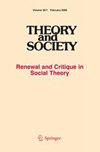Reimagining modern politics in the European mountains: confronting the traditional commons with the neo-rural conception of the common good
IF 1.4
2区 社会学
Q2 SOCIOLOGY
引用次数: 0
Abstract
Abstract Since at least the 1970s, the countryside of Western Europe has been the site of a myriad of “new” communal initiatives. Rural areas that were abandoned during the last century have witnessed the arrival of new inhabitants. These newcomers often flock to the mountains escaping urban lifestyles characterized by individualism, mass-oriented livelihoods, and isolation. Many of these individuals move to areas like the Catalan Pyrenees, where common property and communal institutions have had a strong historical presence. In embracing rural life, these new inhabitants are looking for a more integrated social life in which the commons are, on the one hand, a form of collective private property, and, on the other, represent a more egalitarian way of life in which contributing to the collective effort is not only an efficient way of dealing with particularly harsh ecological conditions, but also an ideological statement that defines the community as something different: an alternative to urban capitalism. Two definitions of the commons are colliding in these mountains; two longstanding lines of political thought are converging and establishing a dialogue that is not always easy: (1) traditional ideologies of land ownership that defined common property over the centuries, not based on economic equality, but on private property and locally shared responsibility on the economic base of the community; and (2) utopian anti-capitalism that views the commons as an alternative mode of social organization and ownership based on egalitarianism.重新构想欧洲山区的现代政治:用共同利益的新农村概念面对传统的公地
至少从20世纪70年代开始,西欧农村就成为无数“新”社区倡议的场所。上个世纪被遗弃的农村地区见证了新居民的到来。这些新移民经常涌向山区,逃避以个人主义、大众为导向的生活方式和与世隔绝的城市生活方式。这些人中的许多人搬到了像加泰罗尼亚比利牛斯山脉这样的地区,那里的共同财产和公共机构在历史上有着强大的存在感。在接受农村生活的过程中,这些新居民正在寻找一种更加一体化的社会生活,在这种生活中,公地一方面是集体私有财产的一种形式,另一方面,代表着一种更加平等的生活方式,在这种生活方式中,为集体努力做出贡献不仅是处理特别恶劣的生态条件的有效方式,而且也是一种意识形态的声明,将社区定义为不同的东西:城市资本主义的替代品。公地的两种定义在这些大山中相互碰撞;两种长期存在的政治思想正在汇合,并建立起一种并不总是容易的对话:(1)几个世纪以来界定共同财产的传统土地所有权意识形态,不是基于经济平等,而是基于私有财产和社区经济基础上的地方共同责任;(2)乌托邦式的反资本主义,将公地视为基于平均主义的社会组织和所有权的另一种模式。
本文章由计算机程序翻译,如有差异,请以英文原文为准。
求助全文
约1分钟内获得全文
求助全文
来源期刊

Theory and Society
SOCIOLOGY-
CiteScore
6.30
自引率
6.90%
发文量
31
期刊介绍:
Theory and Society is a forum for the international community of scholars that publishes theoretically-informed analyses of social processes. It opens its pages to authors working at the frontiers of social analysis, regardless of discipline. Its subject matter ranges from prehistory to contemporary affairs, from treatments of single individuals and national societies to world culture, from discussions of theory to methodological critique, from First World to Third World - but always in the effort to bring together theory, criticism and concrete observation.
 求助内容:
求助内容: 应助结果提醒方式:
应助结果提醒方式:


